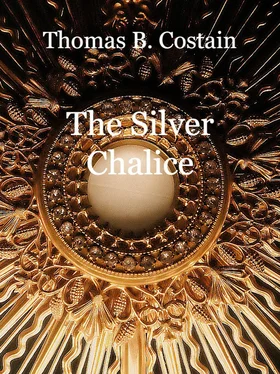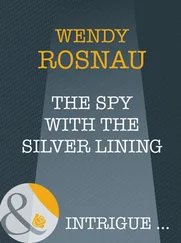Thomas B. Costain - The Silver Chalice
Здесь есть возможность читать онлайн «Thomas B. Costain - The Silver Chalice» — ознакомительный отрывок электронной книги совершенно бесплатно, а после прочтения отрывка купить полную версию. В некоторых случаях можно слушать аудио, скачать через торрент в формате fb2 и присутствует краткое содержание. Жанр: unrecognised, на английском языке. Описание произведения, (предисловие) а так же отзывы посетителей доступны на портале библиотеки ЛибКат.
- Название:The Silver Chalice
- Автор:
- Жанр:
- Год:неизвестен
- ISBN:нет данных
- Рейтинг книги:5 / 5. Голосов: 1
-
Избранное:Добавить в избранное
- Отзывы:
-
Ваша оценка:
- 100
- 1
- 2
- 3
- 4
- 5
The Silver Chalice: краткое содержание, описание и аннотация
Предлагаем к чтению аннотацию, описание, краткое содержание или предисловие (зависит от того, что написал сам автор книги «The Silver Chalice»). Если вы не нашли необходимую информацию о книге — напишите в комментариях, мы постараемся отыскать её.
The Silver Chalice — читать онлайн ознакомительный отрывок
Ниже представлен текст книги, разбитый по страницам. Система сохранения места последней прочитанной страницы, позволяет с удобством читать онлайн бесплатно книгу «The Silver Chalice», без необходимости каждый раз заново искать на чём Вы остановились. Поставьте закладку, и сможете в любой момент перейти на страницу, на которой закончили чтение.
Интервал:
Закладка:
Basil took a seat on the other side of the table and regarded his companion with a worried frown. It was a stifling hot day and his bodily discomfort equaled the mental distress he was feeling.
“I have heard a little about such matters, but I confess I gave them no serious thought,” he said. He dipped his hands in a bowl of water standing beside the table and laved his face slowly. “I begin to see, Quintus, that I have much to learn.”
“Much indeed, my master,” answered Quintus. It was clear that he had some hesitation about pursuing the topic further. After a brief delay, however, he added: “You are in need of advice. There are pitfalls which perhaps you do not see.”
The legally adopted son of the family had never questioned the future. It was easy enough to see the possibility of pitfalls for others, but how could they exist in his own carefully cleared path?
He leaned forward and placed his forearms on the cool marble of the table.
“To what do you refer?” he asked. “Do you expect—legal difficulties?”
When Quintus did not answer at once, Basil, whose mind, once aroused, was quick and aggressive, began to understand the difficulty in which his father’s assistant now found himself. If some kind of legal complication lay ahead, it would be a matter of concern for the young Roman to ally himself with the winning faction. Could he be blamed for thinking of his own interests?
Quintus rubbed a finger thoughtfully down the length of his arched nose, keeping his eyes lowered. He was deep in consideration of the problem. When he looked up finally, it was clear he had made his decision. He smiled and nodded to his companion.
“You are the rightful heir,” he declared, his voice once more precise and charged with conviction. “You were adopted legally with the five witnesses and the formula established in the Twelve Tables. I know your father considered you his son. It is my duty to stand by you and to give you such support as I may—if the need arises.”
Basil rose to his feet and began in an agitated mood to pace about the room. As his father had predicted, he had grown tall, a full two inches above the average in height; but he was slenderly proportioned and fitted more, if strength were the test, for the sedentary life he had elected to live than the more active role which was devolving on him now. The doubts planted in his mind by Quintus Annius had brought a deep wrinkle of worry to his finely proportioned brow.
“You say you will support me—if the need arises,” he declared, pausing at the table and gazing down unhappily at its occupant. “What do you mean by that, Quintus Annius?”
The secretary answered by propounding a question of his own. “What opinion do you hold of your father’s brother?”
Ignatius had one surviving relation only, a brother named Linus. Ten years the junior in point of years, Linus had depended on the head of the family in everything, and it had been due to the guidance and the financial assistance of Ignatius that the younger brother had attained some degree of affluence in the shipping trade. The adoption of a son into the family had been a great blow to Linus, as Basil had been well aware.
“If your claim could be set aside,” went on Quintus, speaking in a low tone, “this—this base brother of my noble employer would himself become the head of the gens.”
“But, Quintus,” cried Basil, finding such doubts bitter to entertain, “there can be no doubt of my rights in the matter.”
“None whatever. In my mind or in yours. In the minds of fair and honest men. But, my master, it happens that of the five witnesses three are now dead. The fourth—his name was Christopher and he was called Kester of Zanthus—has left Antioch and there seems some uncertainty as to his whereabouts. Some say he went to Jerusalem. He was over fifty when the ceremony took place. Can we be sure he is still alive? This leaves us with one of the five, and I consider it a great misfortune that the one should be Hiram of Silenus.” He again ran a forefinger along the bridge of his nose. “Hiram of Silenus is a man of the most questionable character. I hear his financial standing at the moment is far from sound. If it entered the mind of Linus to dispute your right, this base Hiram might prove a very unsatisfactory witness. He might be persuaded to have lapses of memory, to have indeed a perversity of recollection to the undoing of your father’s intent.”
“Quintus!” cried Basil. “Why do you raise this terrible doubt?”
“The first lesson you must learn in the world of trade is to consider all possibilities. I may be alarming you without cause. But—I am afraid there is reason for fear. I would not be surprised if Linus had already begun his—his moves in the dark.”
Basil resumed his seat, allowing his head to fall forward into the support of his cupped hands. He had been completely happy when his only concern was the making of clay figures and the carving of silver vessels. This contentious existence into which he had now been plunged was so obnoxious to him that he found it hard to continue the discussion.
“What can I do?” he asked finally.
“You must establish safeguards,” declared Quintus briskly. He was now on familiar ground and quite sure of himself. “You must see Hiram of Silenus at once and sweeten his memory with a rich reward, richer than Linus can afford to offer. Then there are the magistrates. Their friendship will be necessary if Linus appeals to the law. They must be given presents at once. All this I can arrange for you if you have a reluctance to such matters.”
“Must I bribe men to tell the truth?” cried Basil, his mind revolted at the need to begin a new life by such methods. “This is dishonest, base, unclean!”
The secretary seemed unwilling to acquaint this unworldly youth with the full peril of his position. He paused a long time before saying anything more.
“You were sold to Ignatius,” he declared finally. “If Linus can convince the magistrates you were not sold for adoption, what, then, was the basis of the transaction? You were sold—as a slave.” Quintus looked steadily into the eyes of the new head of the family, his mouth drawn into a tight, straight line. “There is no middle ground for you. Either you are master here or a slave, subject to the orders of Linus. Think of this well! It would be a mistake, a terrible mistake, not to take every step to protect yourself against the”—his composure left him suddenly and he allowed his voice to rise—“against the greed of this man, this unworthy brother who is like to a boar’s snout, this hoof of a sick camel, this fester on a leper’s skull!”
5
Angry, incredulous, filled with the bitterness of self-blame, Basil rose and left the court. Heads were turned carefully in the other direction as he strode out through the crowded room. No one looked up or nodded to him. The decision had left him an outcast, one to whom free men did not speak.
One thought filled his mind to the exclusion of everything else, even of speculation as to what lay before him now. He could not escape from the face of the magistrate who had presided. It represented the forces which had led to his undoing. It seemed to him the embodiment of everything evil, the face of a satyr run to seed. The eyes of this evil old man had been fixed on him from the moment the hearing began, filled with scorn and ill will. They seemed to be saying: “You have been the luckiest of all men, raised from the gutter of the Ward to untold wealth; you have everything in your favor; you are heir to the greatest fortune in Antioch, and people scrape before you and agree with what you say and declare you to be handsome and gifted; you can have your pick of friends and your choice of wives. But I, Marius Antonius, represent the law, and because you have been too blind and too haughty to seek my favor and pay me what it is worth, I have it in my power to break your pride, to cast you from the heights to the depths; and that is what I propose to do, O Basil, son so-called of Ignatius, who shall be forevermore now Basil, son of Theron, seller of pens and ink.”
Читать дальшеИнтервал:
Закладка:
Похожие книги на «The Silver Chalice»
Представляем Вашему вниманию похожие книги на «The Silver Chalice» списком для выбора. Мы отобрали схожую по названию и смыслу литературу в надежде предоставить читателям больше вариантов отыскать новые, интересные, ещё непрочитанные произведения.
Обсуждение, отзывы о книге «The Silver Chalice» и просто собственные мнения читателей. Оставьте ваши комментарии, напишите, что Вы думаете о произведении, его смысле или главных героях. Укажите что конкретно понравилось, а что нет, и почему Вы так считаете.












